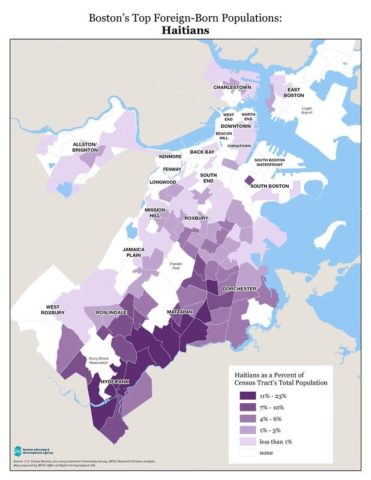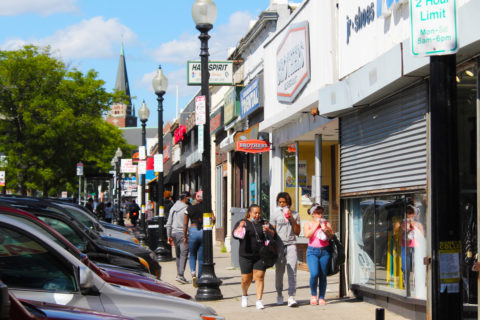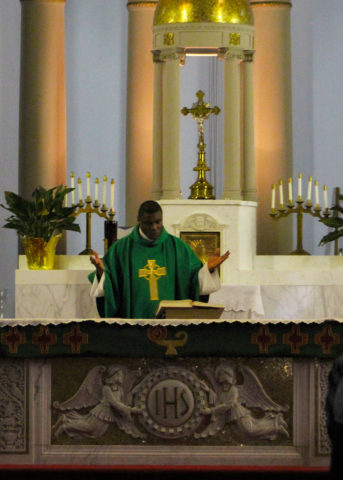The first “Haitian” church in Boston, St. Leo’s was the centerpoint of the early Haitian community. The first to have a French and later Kreyol mass, St. Leo’s also hosted the Haitian Multi-Service Center throughout the 1970s and 1980s, acting as a vital point of reference for both new immigrants and established families. Today, the Multi-Service Center has moved to Columbia Road, where it continues St. Leo’s legacy of welcoming, educating, and integrating immigrants.
Haitians
Haitian Overview

Boston is home to the third-largest community of Haitian immigrants in America. Over the course of more than sixty years, Haitians in Boston have overcome steep obstacles and negotiated strict concepts of identity and belonging to claim a title as Haitian-Bostonian.
Origins and Ripples
The first Haitians in Boston came as professionals and students, fleeing the oppressive regime of Francois “Papa Doc” Duvalier in the 1950s and 1960s, whose paramilitary “macoutes” murdered and silenced any opposition. Wealthier families in Haiti sent children to study abroad as professors in Haiti were jailed or exiled, and Boston’s universities offered prospects of higher education for those who could afford migration. Other Haitians came as domestic workers or undocumented laborers. Yet many early immigrants envisioned a return to Haiti rather than a life in America, and did not consider Boston a long-term community. By the 1970s, economic aid to Haiti meant migrants increasingly came to Boston from New York, Miami, or Montreal rather than directly from the island. Many of these second wave immigrants were working class laborers seeking a gateway to the American middle class.

Haitian businesses line the streets of Blue Hill Avenue in Mattapan. The spire of St. Angela church looms in the background, while an assortment of stores draw in visitors on a busy Saturday. Boutiques offer richly colored dresses, often on display outside, while restaurants, bodegas, dental offices, and apparel stores all cater to a largely Haitian crowd.
An American Dream?
Boston’s allure for many Haitian immigrants in the 1970s rested on housing and economic mobility. The famous triple-deckers of Dorchester allowed many working class Haitians to gain a foothold to the middle class, creating opportunities for Haitians to own their own homes, become landlords, and exercise more independence. Affirmative action programs at universities, banks, and government positions in Boston during the 1970s also gave middle class Haitians economic opportunities once restricted to white Bostonians. The “Massachusetts Miracle,” an economic boom that gripped the state through the 1980s, turned Boston into a primary destination for Haitian immigrants and created many new jobs in the professional and service sectors. Haitian entrepreneurs began starting successful neighborhood businesses, while Haitians broke race barriers in gaining entry to jobs in the medical, teaching, and social work fields.
Communion to Community
Early waves of Haitians in Boston found themselves uniquely isolated linguistically and culturally. In spite of these obstacles, the existence of Catholic churches in Mattapan and Dorchester offered an early center for Haitians of many different backgrounds to gather and maintain a sense of community. Catholic rites, ministries, and parochial schooling offered a familiar link to Haiti, despite racial and linguistic divides. St. Leo’s Church was the first to offer services in French and later Kreyol, and the blossoming Haitian community sprang up around St. Leo’s as well as St. Matthew and St. Angela in Dorchester and Mattapan. The Haitian Multi-Service Center, which started giving ESL and citizenship lessons in 1978 in a wing of St. Leo’s, was one of the most prominent community advocacy groups for early Haitian migrants.

Rev. Massillon delivers mass in St. Angela Church of Mattapan, a predominantly Haitian parish. Catholic churches and the services they offer have historically united the Haitian community in Boston. Today they share space with newer evangelical churches, like the Jubilee Church down the street, as well as other Christian denominations.
“The Only Country With A Surname”
More mutual aid organizations sprung up as the community solidified its ties to Boston in the 1980s, and cultural advocacy became dominant as Haitian patriotism was challenged by stereotypes of the nation as impoverished and stricken with HIV/AIDS. Haitians became infuriated at the constant mention of “Haiti: the Poorest Country in the Hemisphere” and racist attacks in Boston increased. Haitians were attacked by white mobs during the desegregation of Boston’s public schools, and denied access to jobs and medical care during the HIV/AIDS crisis. Haitians in Boston responded by strengthening their cultural pride, calling for Kreyol to be taught in schools and the revival of Vodou as a religious practice. Political activism against the Duvalier regime also increased as Haitians took to the streets of Boston to raise awareness of the fight for democracy on the island.
Haitian-Bostonians Today
Haitian immigration has continued to shape Boston in recent years, including an influx of refugees after the 2010 earthquake. Today’s Haitian Bostonians balance solidarity for the wider Black community with their unique Haitian identity, and are eager to move beyond rivalries and stereotypes that once isolated them from a diverse Black community. Haitians have created economic niches within the nursing and taxi industries, but new generations of young Haitians are looking for greater opportunities in professional work. Recently, pioneering Haitian elected officials like Marie St. Fleur and Linda Dorcena Forry have shifted demographics in the State House, but more still needs to be done in order to fully represent Boston’s Haitian community. Rich in culture and community, Mattapan continues to sit on the margins of Boston’s consciousness, a fact that downplays the vibrancy of Boston’s Haitian heart.
Community Spotlight
Please click on the map dots to learn more about each location. They representative many different aspects of the Haitian community. Each location contains a general description as well as additional photos and contact information.
-
-
St. Angela Merici Church
1548 Blue Hill Ave, Mattapan, Boston MA
617-298-0080
www.amcatholic.org
The heart of Mattapan’s Haitian Catholic community, St. Angela’s (now Our Lady of Mount Carmel) is located at the center of Mattapan Square along Blue Hill Avenue. The Rev. Feguens Massillon gives masses in English, French, and Haitian Creole. For a schedule of masses, find their website at amcatholic.org. -
Asosiyasyon Fanm Asisyen nan Boston (AFAB)
http://afab-kafanm.org/wp/programs-services/
330 Fuller St, Dorchester, Boston MA
(617) 287-0096
Known by its acronym, AFAB, the Haitian Women’s Association of Boston offers a variety of services to Haitian women and their children. Dedicated to empowering women within the community, AFAB provides housing and protection for women in need, as well as workshops on housing access, financial literacy, employment, and domestic violence prevention. -
IFSI-USA
575 American Legion Highway, Roslindale, Boston MA
https://www.ifsi-usa.org/whatwedo
857-251-9806
Short for Immigrant Family Services Institute, IFSI is a vital community resource for Haitian immigrant families. IFSI offers adult education classes focusing on integrating new immigrants to Boston, as well as a variety of academic enrichment programs for children outside of school. In recent years, B.C. High’s French department has helped supply IFSI with tutors and volunteers for their after-school and weekend programs. -
Le Foyer Bakery
132 Babson St, Mattapan, MA
(617) 298-0535
The oldest Haitian bakery in Boston, Le Foyer is located just off Mattapan Square and was one of the first Haitian businesses to set up shop in Mattapan. Now an icon and pillar of the community, Le Foyer has offered its signature Haitian pate, a flakey and buttery puff pastry, to residents and visitors for over forty years. To commemorate her husband and celebrate the bakery’s longevity, Le Foyer’s owner Edna Etienne has created a scholarship fund to help local Haitian students afford a good education. -
Radio Concorde
Unlisted address, Mattapan
radioconcorde.com
Ever wondered what “pirate radio” is? In 2019, the FCC levied record-breaking fines on the owners of two Haitian radio stations in Boston, including Radio Concorde, labelling them radio pirates—stations that broadcast locally on frequencies registered to other radio stations. It was a striking blow for a familiar community institution. For thousands of Haitians in Boston, Radio Concorde was a vital link to news and information from Haiti, for Haitians. Broadcast out of a small office in Mattapan, Radio Concorde’s signal only travelled a few miles, but was fundamentally important for Haitian residents who only speak Creole to receive news. Past guests included state senator Linda Dorcena Forry, the first Haitian woman elected to the state Senate. The FCC only offered a one month filing window for low power FM radio stations to receive permits and almost never accepts applications, effectively barring small-scale community stations like Radio Concorde from legally staying on the air. Radio Concorde now operates exclusively online.
Themes
- 1950s-70s: yon pye anndan, yon pye deyò (“one foot in and one foot out”)
- First wave of professionals and students in the 1950s flee Francois ‘Papa Doc’ Duvalier
- Undocumented domestic workers and textile laborers accompany them
- In the 1970s, more Haitians move to Boston internally from New York and Miami
- Boston’s allure due to housing and economic mobility
- Triple deckers create a new class of independent, home-owning Haitians, and offer an alternative to public housing
- Affirmative action programs at universities, banks, and engineering firms open opportunities for middle class Haitians in Boston to gain long-term jobs
- Tensions around assimilating into the African-American community
- Younger Haitian students embrace broader Black identity and civil rights
- Older Haitian immigrants tend to advocate for a culturally distinct Haitian identity, influenced in part by the “model minority” myth
- Catholic churches structure growing Haitian settlement
- St. Leo’s is the first “Haitian church,” offering a weekly French service
- St. Matthew and St. Angela join St. Leo as pillars of the growing community
- Multi-Service Center begins operations in 1978 at St. Leo’s
- “Massachusetts Miracle” grows professional and service industry, turning Boston into a primary destination for Haitians in the 1980s
- Mutual aid groups begin to organize and advocate in order to solve internal problems
- AFAB founded in 1988
- Worsening conditions in Haiti and AIDS epidemic lead to increased racism in Boston
- Haitians were publicly insulted, denied jobs, medicine
- Reaction led to increased cultural advocacy, including efforts to teach Kreyol and revive indigenous religion (Vodou)
- Haitian entrepreneurs start successful businesses, breaking barriers to entry for Black Bostonians in medicine, social work, teaching
- Boston becomes the focal point for Haitians across New England
- Haitian nationalism and advocacy against the Duvalier regime reaches a peak in late 80s
- In recent years, refugees fleeing the coup (1991-1994) and the earthquake (2010), from poorer areas of Haiti, settle in Boston
- Haitians begin gaining political representation in the Massachusetts Senate and House (Marie St. Fleur, Linda Dorcena Forry)
54k
Haitians live in Greater Boston with 25k in Boston
5th
largest immigrant group in Boston
3rd
largest destination for Haitians in the US is Massachusetts with 8,600 people arriving after the earthquake in 2010
66%
of Haitians are first-generation immigrants
43%
of Haitians who are second generation or greater have a bachelor’s degree or higher which is a 31% increase over those who are first-generation
$44k
is the median household income and 22% of Haitians are homeowners







